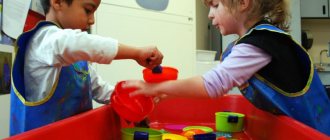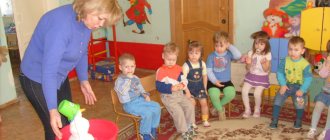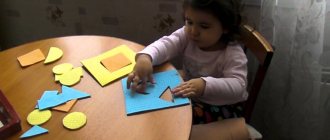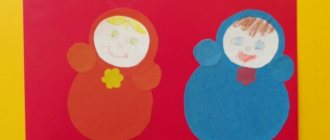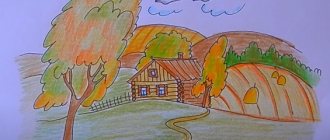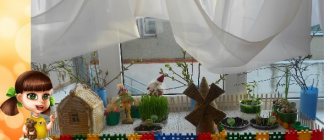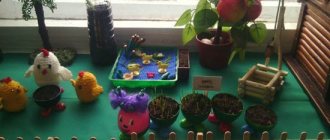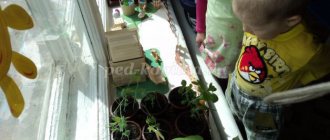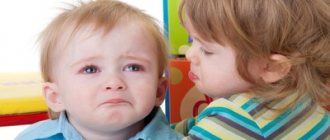Nursery rhymes in the younger group of kindergarten: a large selection of nursery rhymes for children
Nursery rhymes for preschoolers in the junior group of kindergarten are a special collection of rhymes with a more complex meaning than for infants, but with the same useful developmental potential, new words and the ability to develop the speech of a 1, 2 or 3 year old child.
Among the nursery rhymes intended for such a small child, finger games are very popular, to which a separate block of our nursery rhymes is dedicated. However, here you will find a lot of useful works for the development of not only motor skills, but also the baby’s mental abilities, memory, and articulation.
- Finger-boy, where have you been? - I went to the forest with this brother. I cooked cabbage soup with this brother. I ate porridge with this brother. I sang songs with this brother!
- Okay, okay, where were you? - By Grandma! - What did you eat? - Porridge! - What did you drink? - Mash! Porridge is buttery, Mash is sweet, Granny is kind. They drank, ate, flew home, sat on their heads, and began to sing.
- Forty, forty! Where were you? - Far! She lit the stove, cooked porridge, jumped on the threshold - called guests. The guests arrived and sat down on the porch. She gave to this, She gave to this, She gave to this, She gave to this, But she didn’t give to this: He didn’t walk on water, He didn’t chop wood, He didn’t light the stove, He didn’t cook porridge...
A horned goat is walking, a butted goat is walking, her legs are stomping, her eyes are clap-clap. Those who don’t eat porridge, don’t drink milk, gore, gore, gore.
The night came, brought darkness; The cockerel dozed off, the cricket began to sing. It’s late, son, lie down on your side, bye-bye, go to sleep...
Kitty, kitten-cat, Kitty - gray tail! Come, kitty, spend the night, rock my baby, lull her to sleep.
Bye-bye, bye-bye, let's buy felt boots for our son, put them on his little feet, and let's go down the path. Our son will walk and wear new felt boots.
Bye-bye-bye-bye, Don't lie on the edge. A little gray top will come, He will grab the barrel. He will grab you by the barrel and drag you into the woods, under the broom bush. Don’t come to us, little top, don’t wake up our baby.
The mice are dancing in circles, the cat is dozing on the bed. Hush, mice, don't make noise, don't wake up Vaska the Cat. When Vaska the cat wakes up, he will break up the whole round dance.
Cockerel, cockerel, Golden comb, Butter head, Silk beard! Why do you get up early, sing loudly, and don’t let Vanya sleep?
The grass ant rose from its sleep, the tit bird took the grain, the bunny took the cabbage, the mice took the crust, the boys took the milk.
Rain, rain, more. The grass will be thicker, the leaves will be greener, the berries will be redder.
Rainbow-arc, Don't let it rain. Come on sunshine, Bellflower!
Our ducks in the morning - quack-quack-quack! Quack-quack-quack! Our geese by the pond - Ga-ga-ga! Ha-ha-ha! And the turkey in the middle of the yard - Ball-ball-ball! Bullshit! Our little girls at the top - Grru-ugrr! Grru-ugrr! Our chickens through the window - Ko-ko-ko! Ko-ko-ko-ko! And how Petya the Cockerel, Early, early in the morning, will sing to us cuckoo!
Nursery rhymes
Folk nursery rhymes will amuse the baby during feeding and help the mother quickly feed the fidget.
***
Tilly-hour, Tilly-hour! Our lunch arrived. We eat a spoon for mom, We eat a spoon for dad, For the dog and for the cat, Sparrow knocks on the window: “Give me a spoon too!” So lunch is over.
***
Shirt, shirt, White-haired girl, Jumped on the threshold, Called guests. Guests, to the yard - Porridge, on the table, Guests from the yard - Porridge from the table.
***
The magpie-crow cooked porridge, fed the children, gave it to this one, gave it to this one, - Where were you? He didn’t chop wood, he didn’t light the stove, he didn’t cook porridge, he came later than everyone else.
***
A horned goat is following the little guys. Who doesn't eat porridge? Doesn't drink milk? Gore, gore, gore!
*** I bake, bake, bake, The kids all have a pie, And for my dear mother I’ll bake two gingerbread cookies. Eat, eat, mommy, two delicious gingerbread cookies. I'll invite the kids and treat them to pies -
Eat, please!
***
Lyuli, lyuli, lyuli, The ghouls flew in, The ghouls began to coo, The ghouls began to fuss: They flew into a corner, They lit a fire, They began to cook porridge, They began to feed Masha.
***
Slowly, little by little, little by little, slowly, We ate porridge with you, Isn’t the porridge good?! This is a spoon, this is a cup, There is buckwheat porridge in the cup. The spoon was in the cup, the buckwheat porridge was gone.
***
Who is our favorite? - The first spoon is for mom, and the second is for whom? - Yes, for your dad, for whom the third spoon? - For a cheerful nesting doll, Eat for a woman, Eat for a grandfather, For a boy - for a neighbor, For girlfriends and friends, Eat more and don’t regret it! Eat for the holiday, noisy, bright, For the guests and for the gifts, For the kitten, for Timoshka This little spoon And for the red cat, Here the plate is empty!
***
The delicious porridge is steaming, Dasha sits down to eat the porridge, the porridge is very good, they ate the porridge leisurely. Spoon by spoon, Ate a little at a time.
*** Duck duckling, Cat kitten, Mouse little mouse Calling for lunch. The ducks ate, the cats ate, the mice ate. Have you not yet? Where's your spoon? Eat at least a little.
*** The donut, the flatbread, sat in the oven, looked at us, and wanted to put it in my mouth.
***
Till-hour, tick-till-hour, we're having lunch now We'll eat a spoon for mom, We'll eat a spoon for dad, For the dog and for the cat, the sparrow is knocking on the window, give me a spoon too... so lunch is over.
*** Lyuli, lyuli, lyulenki, The ghouls flew in, The ghouls began to say: “What should we feed Sonechka?” One will say: “porridge”, Another – “yogurt”, The third will say – “milk, And a ruddy pie.”
***
Our Vanyusha is a fidget and won’t finish his lunch. They sat down, stood up, sat down again, and then ate all the porridge.
*** Oh, lyuli, lyuli, lyuli, ships sailed into the sea, they brought porridge to Masha. Kasha's little milk For my beloved daughter. Masha, open your mouth, swallow the sweet porridge. And whoever eats porridge, listens to mom and dad, grows up strong, healthy and beautiful.
***
Am! Am! Am! I'll give you candy, But first, for our mother, eat a spoonful of semolina porridge! Am! Am! Am! Eat the porridge yourself, Vanya! Eat a spoonful for daddy, you'll grow up a little more! Am! Am! Am! If you don't eat, I'll eat it myself. And I’ll grow a whole mile with every spoon! I will become completely big, and then I will eat you!
Long-term planning for reading fiction in the first junior group
Ekaterina Khudyshkina
Long-term planning for reading fiction in the first junior group
Long-term planning for reading fiction in the first junior group.
week Program content
2 Reading the nursery rhyme “Our Masha is little...”
S. Kaputikyan’s poem
“Masha is having lunch”
- help children understand the content of the nursery rhyme, pay attention to the words alenka, black-browed; make you want to listen to the nursery rhyme more than once; introduce the poem; learn to finish onomatopoeic words and small phrases found in Gerbov’s poem 68
3 Reading a fairy tale by V. Suteeva “Chicken and Duckling”
Purpose: to introduce the fairy tale, to give an idea of the appearance of the duckling, to practice the correct use of the word also Gerbova 34
4 Reading a poem by G. Sapgira “Cat”
D\pr
"Pussy does not leave us!"
- explain to children how differently you can play with a toy and talk to it; help repeat and come up with simple appeals to the toy Gerbova 78
week Program content
1 Repetition of familiar fairy tales Reading the nursery rhyme “Cucumber, cucumber...”
- recall familiar fairy tales with children, help children dramatize excerpts from works; help me remember Gerbov's new nursery rhyme 63
2 Reading the German folk song “Three Merry Brothers”
- develop the ability to listen to a poetic text, repeat onomatopoeic words, perform the movements mentioned in Gerbov’s text 32
3 Russian folk song “The cat went to market...”
. Pies for a cat - introduce the content of a folk song; learn to listen and answer the teacher’s questions; form round lumps of plasticine;
4 Reading the story E. Charushin "Chicken"
— teach children to perceive
literary text without visual accompaniment; enrich vocabulary; encourage repeating individual words when re- reading Gerbova's story Week 45
Program content
1 Reading the Russian folk tale “Teremok”
- introduce children to a fairy tale, make them want to play in a fairy tale
2 Reading the story E. Charushin "Hedgehog"
-introduce a new story, develop the ability to listen silently, without distraction; introduce the habits of the hedgehog Gerbov 104
3 Reading the Russian folk tale “Turnip”
— introduce children to Gerbov’s new fairy tale 57
4 Reading a fairy tale by L. Tolstoy's "Three Bears"
— to teach children to listen to large-scale works; evoke an emotional response; form intonation expressiveness of speech Gerbov 60
week Program content
1 Reading the Ukrainian folk tale “Rukavichka”
- introduce a new fairy tale, make you want to return to it more than once, teach you how to solve Gerbov’s riddles 50
2 Reading a fairy tale by V. Suteeva “Who said meow?”
— to develop skills in perceiving
of art by ear, learning to depict the actions of characters , expressively conveying dialogues from Gerbov’s fairy tale n 53
4 Nursery rhyme “Oh, you little bastard…”
. - repeat the nursery rhyme with the children; teach to guess animals by description, develop attention, teach to ask and answer questions;
week Program content
1 Reading the poem I. Akim “The Christmas tree is dressing up”
- help children remember and learn to independently recite Gerbov’s poem 56
2 Reading the Russian folk tale “Zayushkina’s hut”
-introduce children to a new fairy tale, help them understand its content, and evaluate the actions of the characters; make you want to play Gerbov's fairy tale 91
3 Reading a fairy tale by V. Bianki "The Fox and the Mouse"
- introduce children to the work of V. Bianchi, teach them to help the teacher read a fairy tale, finishing the words and small phrases of Gerbov 89
4 Reading the Russian folk tale “Masha and the Bear”
— teach children to listen to a fairy tale, participate in the dramatization of individual episodes, and form intonation expressiveness of speech; teach Gerbov's retelling 75
week Program content
1 Reading a fairy tale S. Marshak "The Tale of a Stupid Mouse"
— introduce children to a new work, teach them to listen to a poetic text, and practice clear pronunciation of onomatopoeia. Gerbova 37
3 Reading a fairy tale S. Marshak "Mustachioed-Striped"
introduce children to a new work, make them want to listen to it repeatedly, finish the words missed by the teacher Gerbova 102
Nursery rhymes for children 3-4 years old in kindergarten in special moments
Nursery rhymes for children of the younger group.
Goal: developing the ability to show positive emotions in communication with adults and peers. Objectives: • Develop fine motor skills of the fingers and active speech. • Develop interest and love for folklore. • Teach children to pronounce words, phrases, and finish lines. • Cultivate a friendly attitude when communicating with peers and adults. Before the walk . 1. One, two, three, four, five - We are going for a walk. I tied a striped scarf for Katya. Let's put boots on our feet and quickly go for a walk, jump, run and jump. Combing. 1. Grow your braid to your waist, don’t lose a single hair. Grow up, braid, don’t get confused, Mom, daughter, listen. 2. I scratch, scratch my hair, comb my braids! What do we do with a comb? We're doing Tanya's hair. 3. Even though I quarrel with you often, Toothed comb, Hello! Without you, my sister can’t braid her hair. Without you, my brother would have to walk around with shaggy hair all day long. 4. I’m already braiding my braid, I’m already braiding my hair, I’m braiding, braiding, braiding, I say: “Grow, grow, braid - The whole city is beautiful.” We are eating. 1. And we have spoons that are a little magical. Here is the plate, here is the food. There was no trace left. 2. There is a red squirrel on my plate, so that it can be seen, I eat everything to the bottom. Drink, my friend, tomato juice, you will be slim and tall. 3. So the afternoon tea came, the children all sat down at the table. To avoid trouble, let us remember the rules of food: Our feet do not knock, Our tongues are silent. Don't litter at lunch, if you make a mess, clean it up. 4. “I don’t want to eat semolina porridge!” - The girl Masha screamed. “That’s right,” thought the porridge, Good girl Masha.” 5. Deep and shallow, Ships in a plate, Here the boat is sailing, Swims right into your mouth. 6. Let’s put cabbage and potatoes on a spoon and hide it! Try to find it! Cabbage and potatoes are not visible on the spoon. And it’s not on the plate - look! 7. First, it ears ears in a large field, Then it is stored in a peasant barn. Then it is baked in the bakery and served soft and fragrant to the table. 8. Lunch hour came, the children sat down at the table. 9. Take a spoon, take bread, and quickly for lunch. Let's wash ourselves. 1. Wash yourself cleanly, don’t waste water. Your palms will be whiter than snow. 2. I washed my face early this morning from the tap. I myself now know how to wash my face and neck. 3. What does it mean to be clean? Wash your hands often with soap, remove dirt from under your nails, and cut them quickly. Wash your face in the morning and again in the evening. I'll wash my ears clean - my ears will listen better. Why do your eyes sparkle? I washed my face with soap. I still need skill to brush my teeth deftly. Hair and comb are friends, My hairstyle is good. Ay, okay, ay, okay, We are not afraid of water, We wash ourselves clean, We smile at Mom. 4. Water, water, Wash my face, So that my little eyes shine, So that my cheeks turn red, So that my mouth laughs, So that my teeth bite. 5. Wash your hands clean with warm water. I'll take a piece of soap and rub my palms with it. 6. Warm water will wash Tanya’s face, Antoshka’s fingers, Sasha’s palms. 7. You must wash yourself in the morning, evening and afternoon, before every meal, after sleep and before bed. 8. Tanya, Mashenka and Zhenya, Wash your hands thoroughly. Don't skimp on soap. I've already set the table. 9. Wash your hands before eating. Dirty hands threaten disaster.
We recommend watching:
Children's folklore Folklore for kids Mother's folklore Nursery rhymes about animals for children 3-4 years old
Similar articles:
Russian folk nursery rhymes for children 2-3 years old
Nursery rhymes for children
Nursery rhymes for children under 1 year old
Poems, nursery rhymes and riddles on the topic: What do I know about myself
Nursery rhymes for kids about vegetables, fruits and various foods
